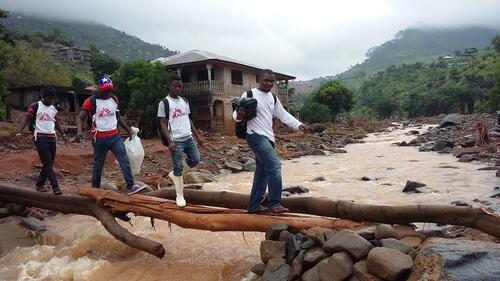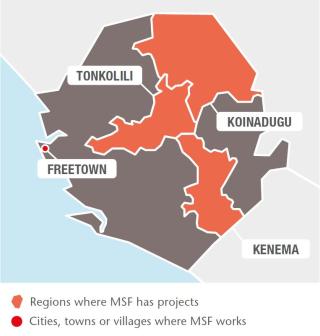
38,300
38,3
14,500
14,5
4,200
4,2

4,400
4,4
600
6
MSF teams work in a number of districts across the country, providing medical care as well as staff training and supplies.
Tonkolili district
In Tonkolili, MSF supports the paediatric ward, maternity and neonatal services, and the blood transfusion laboratory at Magburaka district hospital, and assists Magburaka mother and child health post with staff and supplies.
MSF works with Ministry of Health staff to provide paediatric and basic emergency obstetric care in the community health centre in Yoni chiefdom. At the end of 2016, a study conducted by MSF revealed the under-five mortality rate in rural Yoni chiefdom to be close to the emergency threshold (1.55 deaths/10,000 people/day).
In 2017, during the rainy season, MSF trained and deployed community health workers to conduct malaria screening, treatment and referrals in villages in 10 different locations. A total of 13,792 children were screened and 77 per cent tested positive.
MSF supported four additional healthcare units in the district, with medical supplies and training, mentoring and supervision of Ministry of Health staff.
Koinadugu district
In Koinadugu, MSF staff work in the paediatric and maternity wards and the emergency department at Kabala district hospital. By the end of the year, MSF had assisted 1,314 births and treated 618 women with pregnancy complications – an important achievement in the fight against maternal mortality in the district.
In 2017, teams also started to offer primary healthcare in four health units in Mongo chiefdom and opened a blood bank in one of them. An MSF team supports the community health centre, community health workers, traditional birth attendants and the health post with capacity building, maternal and child healthcare, supplies of essential medicines, health promotion and infection prevention and control. MSF also supports the entire district referral system.
Kenema district
In Kenema, MSF assists 10 health posts in Gorama Mende and Wandor chiefdoms. The team also helps with the referral system and is currently rehabilitating the water and energy supplies for all the facilities. The district was one of the hardest hit during the Ebola outbreak: more than 200 health workers died of the disease. A new teaching hospital, due to open in October 2018, will focus on reducing maternal and child mortality, while helping to develop the country’s health workforce.
Emergency response
In Tonkolili, Koinadugu, Kenema and the capital, Freetown, MSF teams continued to monitor the nutrition situation and to respond to emergencies. In August, MSF participated in the response to the landslide and floods that occurred in Freetown, providing clean water to more than 3,000 people at three different points in the city. MSF also assisted the Ministry of Health during a cholera vaccination campaign that reached around 120,000 people in high-risk areas of the capital, providing staff supervision, health promotion activities and logistical support.


















